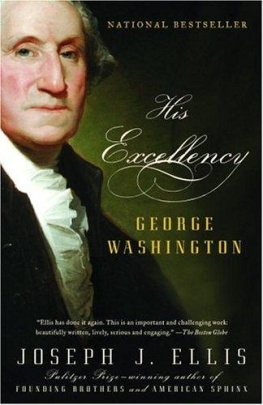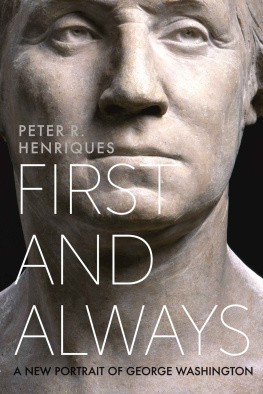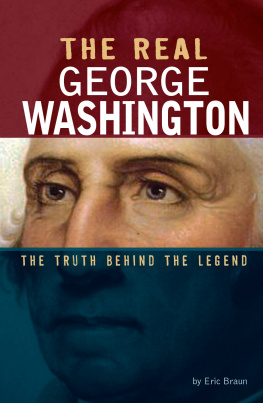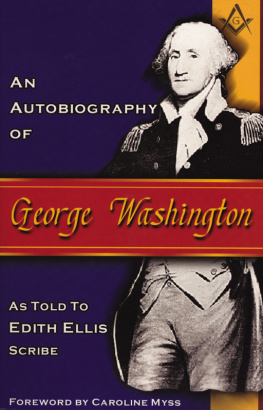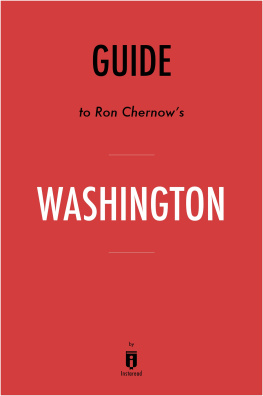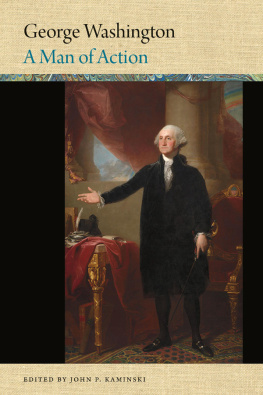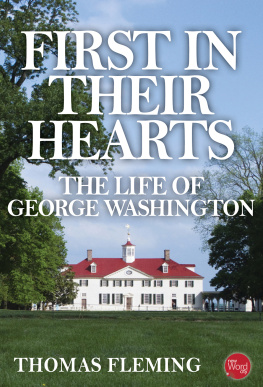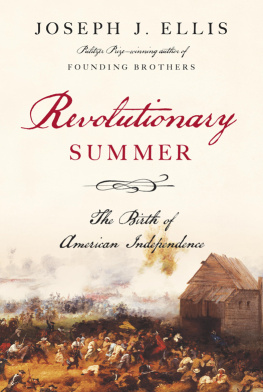
H IS E XCELLENCY
George Washington

J OSEPH J. E LLIS

Alfred A. Knopf New York 2004

CONTENTS
For W. W. Abbot

PREFACE
THE MAN IN THE MOON
My own relationship with George Washington began early. I grew up in Alexandria, Virginia, and attended St. Marys grade school, about eight miles down Mount Vernon Boulevard from the estate where the great man once walked the earth. Because my school was so proximate to Mount Vernon, my teachersall nunsforced us to make frequent pilgrimages to the historic site where the spirit of Americas greatest secular saint resided. Back then the tour was less historically informed than it is now. I dont recall slavery being mentioned at all. I do recall being told that the story of Washingtons wooden teeth was a mythmy first encounter with the notion that you could not always trust what you read in history books. I remember this clearly because the high point of the tour was Washingtons dentures, which were encased in glass and looked to me like a really gross instrument of torture made of metal and bone. The only other thing I remember is the majestic view of the Potomac from the piazza on the east side of the mansion.*
*Apparently I am one of several visitors to Mount Vernon in the 1950s who remembers Washingtons dentures on display, despite the fact that, according to official records, they were never exhibited for the general public until the 1980s. The staff at Mount Vernon cannot explain the discrepancy, nor can I.
In the early 1950s, when I was about ten years old, I was lying on top of a one-story, tar-paper garage with my buddies to watch the annual parade down Washington Street to celebrate the great mans birthday. We loved the occasion because it got us out of school and allowed us to view the bands from the aptly named George Washington and Washington and Lee High Schools. My mother also gave me a dollar billbig money thento spend in those local stores promoting dollar-day sales in honor of Washington, whose picture adorned each bill. All this was happening in the shadow of the city across the river that bore his name, where my father went to work each day, and where the dominating feature of the landscape was a massive monument to one mans memory.
My point is that Washington was ubiquitous for me as I was growing up, an inescapable presence that hovered all around. But apart from the dentures and the piazza at Mount Vernon, Washington remained a mysterious abstraction. He was like one of those Jeffersonian truths, self-evident and simply there. And the beauty of all self-evident truths was that no one needed to talk about them. They were so familiar that no one felt obliged to explain why they merited an annual parade.
Washington was more omnipresent for me than Thomas Jefferson or Abraham Lincoln, but also more distant. If you went to the Tidal Basin or the Mall you could read the magic words on the Jefferson or Lincoln Memorial (We hold these truths to be self-evident...; With malice toward none, with charity toward all...). But there were no words on the Washington Monument, just graffiti scrawled on the walls along the staircase to the top. Jefferson, it seemed, was like Jesus, who had come to earth and spoken directly to us. Washington was like God Himself, levitating above it all. Or, as I eventually came to describe him, Jefferson was like one of those dirigibles at the Super Bowl, flashing inspirational messages to both sides. Washington was aloof and silent, like the man in the moon.
You might wish to regard the pages that follow, then, as my attempt at a lunar landing. The technology to reach the moon was not available when I was lying atop that garage on Washington Street. Nor was there a fully annotated modern edition of Washingtons correspondence, providing access to every letter he sent and received, along with extensive editorial notes on all the major players, moments, and controversies. Now there is. To be sure, a perfectly serviceable edition has been available since the 1930s, and anyone wishing to pursue Washingtons life and times has never been wanting for historical evidence. But the modern edition of the Washington Papers is the mother lode, all the scattered pieces of paper in the family attic gathered together, catalogued, and classified. This massive project is complete except for the final three years of the War for Independence and the final term of the presidency, though the crowded character of those years will keep the editors fully occupied for longer than one might guess. Nevertheless, it seems fair to say that we now have at our disposal every surviving remnant of evidence that biographers and historians can ever expect to see. The great American patriarch sits squarely in front of us: vulnerable, exposed, even talkative at last.
Are we ready to listen? This is not just a rhetorical question. For reasons best explained by Shakespeare and Freud, all children have considerable difficulty approaching their fathers with an open mind. Washington poses what we might call the Patriarchal Problem in its most virulent form: on Mount Rushmore, the Mall, the dollar bill and the quarter, but always an icondistant, cold, intimidating. As Richard Brookhiser has so nicely put it, he is in our wallets but not in our hearts. And speaking of our hearts, a volatile psychological chemistry bubbles away inside all children in simmering pools of dependency and rebellion, love and fear, intimacy and distance. As every parent can testify, initially our children believe we can do no wrong; later on they believe we can do no rightindeed, in Oedipal terms they actually want to kill us. For most of American history our response to Washington in particular and the Founding Fathers in general has been trapped within the emotional pattern dictated by these primal urges, oscillating in a swoonish swing between idolization and evisceration. In Washingtons case the arc moves from Parson Weemss fabrications about a saintly lad who could not tell a lie to dismissive verdicts about the deadest, whitest male in American history.
This hero/villain image is, in fact, the same portrait, which has a front and back side that we rotate regularly. It is really a cartoon, which tells us less about Washington than about ourselves. The currently hegemonic narrative within the groves of academe cuts in the Oedipal direction, making Washington complicitous in creating a nation that was imperialistic, racist, elitist, and patriarchal. While there are some important exceptions to the rule, the reigning orthodoxy in the academy regards Washington as either a taboo or an inappropriate subject, and any aspiring doctoral candidate who declares an interest in, say, Washingtons career as commander in chief, or president, has inadvertently confessed intellectual bankruptcy. (A study of the ordinary soldiers in the Continental army or the slaves at Mount Vernon would be more fashionable.) When not studiously ignored, Washington is noticed primarily as an inviting target for all the glaring failures of the revolutionary generation to meet our own superior standards of political and racial justice. This approach is thoroughly ahistorical and presentistic; but so, for that matter, is its opposite, the heroic-icon tradition. We are back again to the rotating cartoon character. Or perhaps we ought to think of that alluring dockside light in The Great Gatsby, flickering on and off like some synchronized signal of our fondest illusions.
Next page
